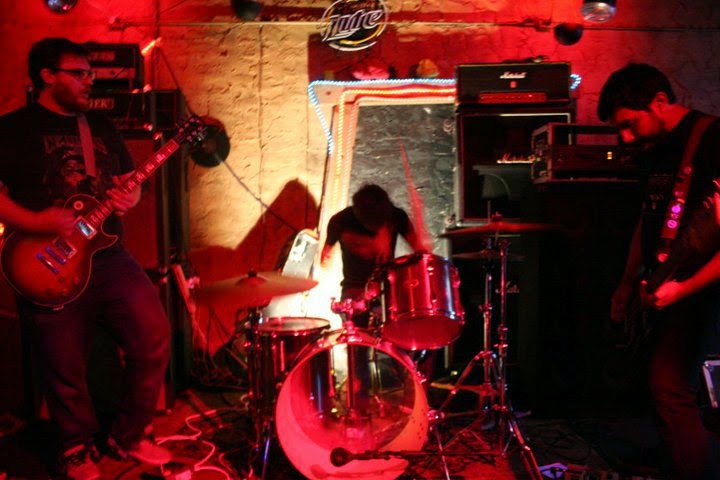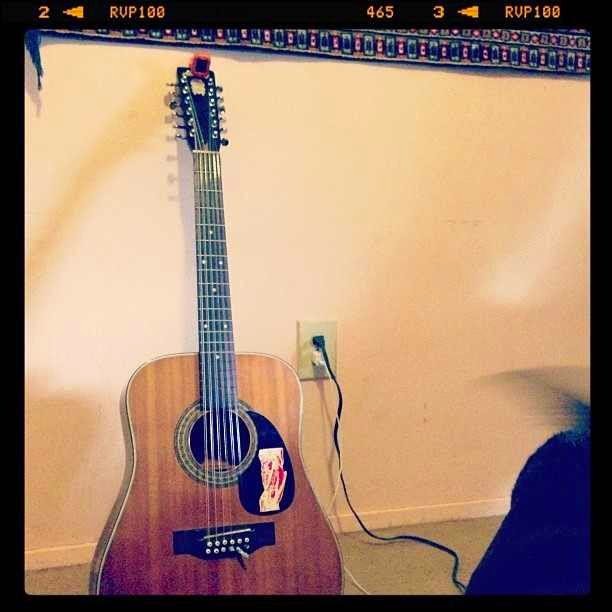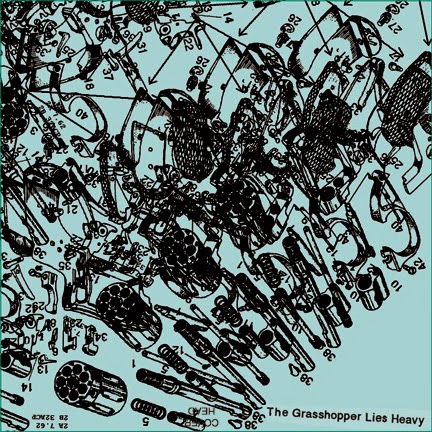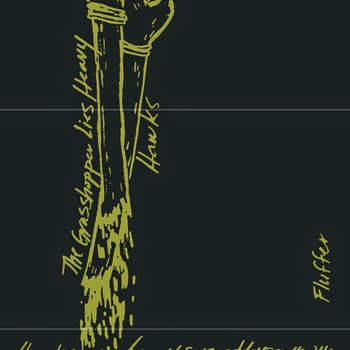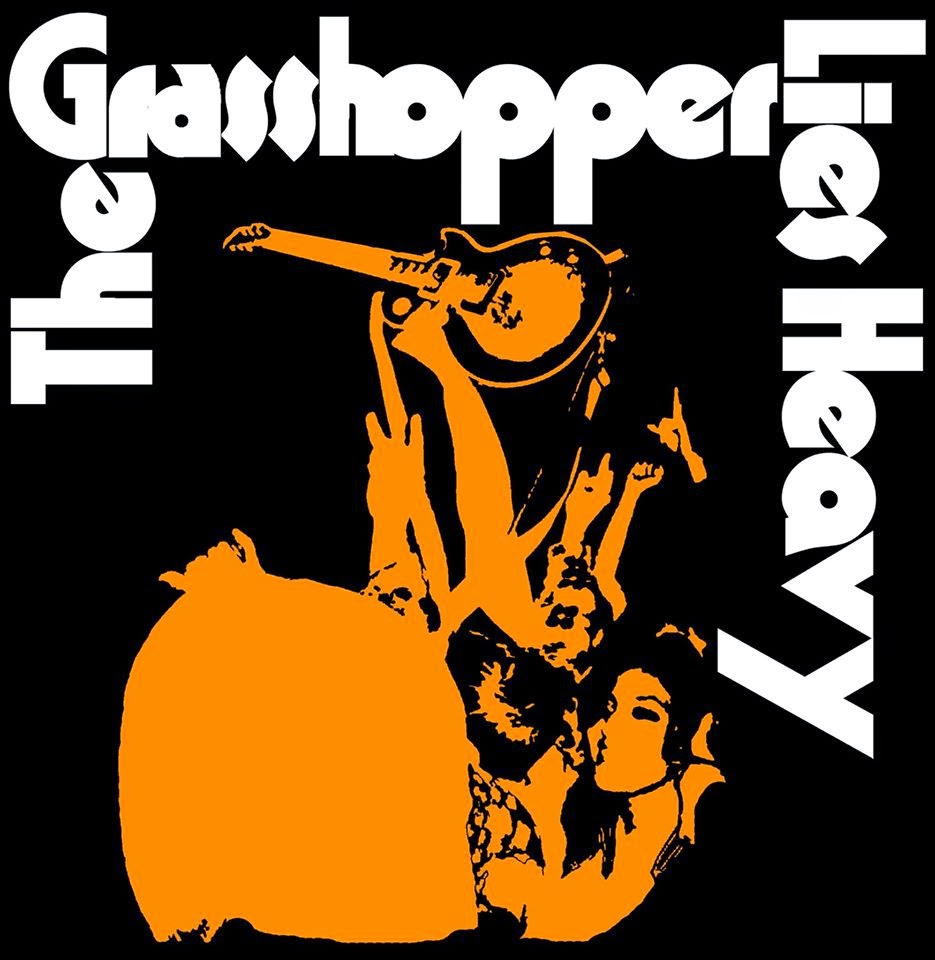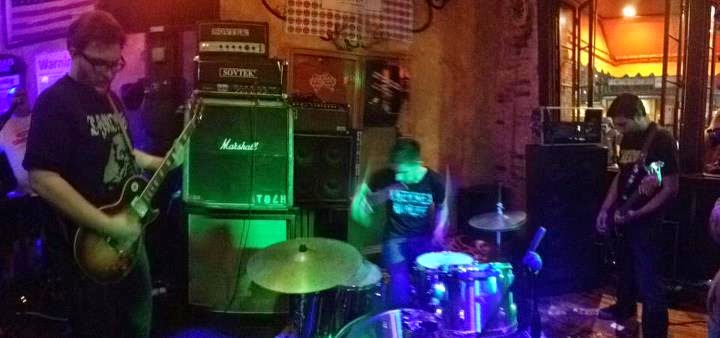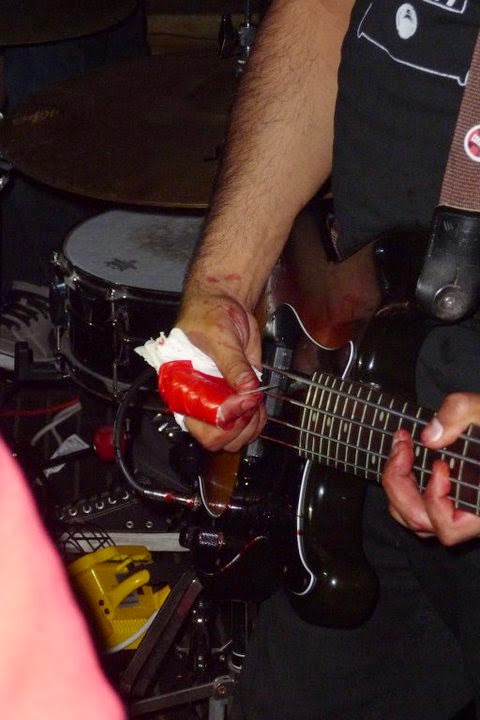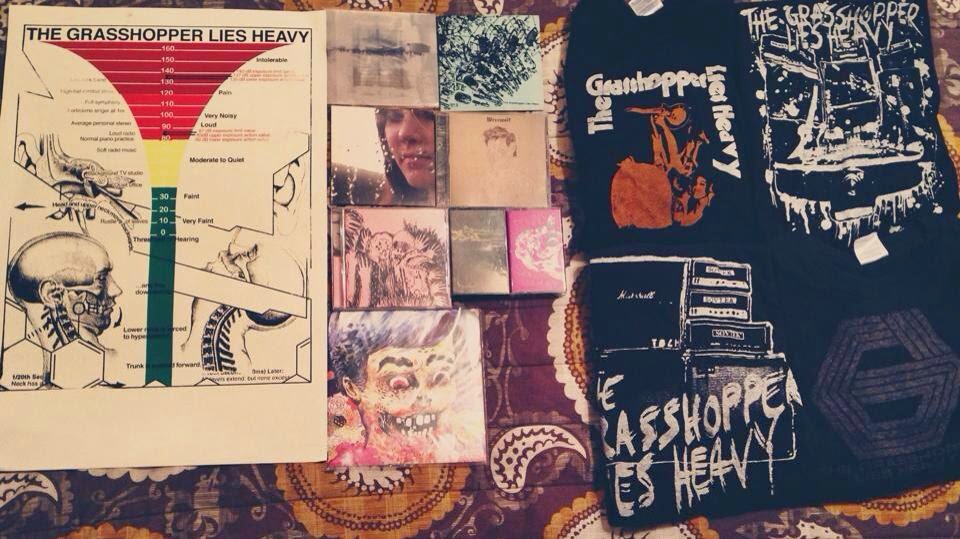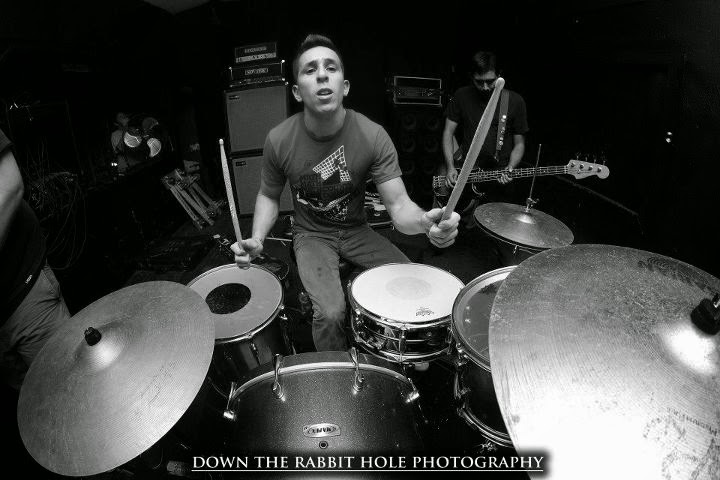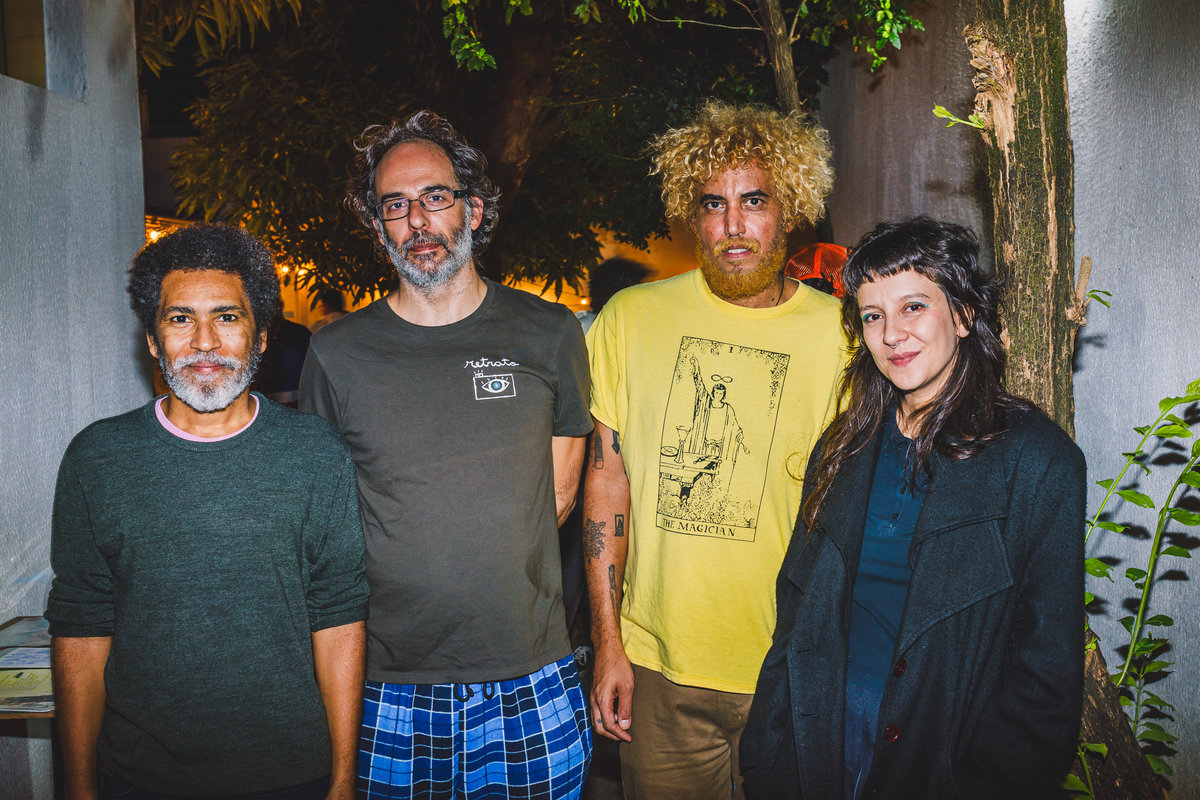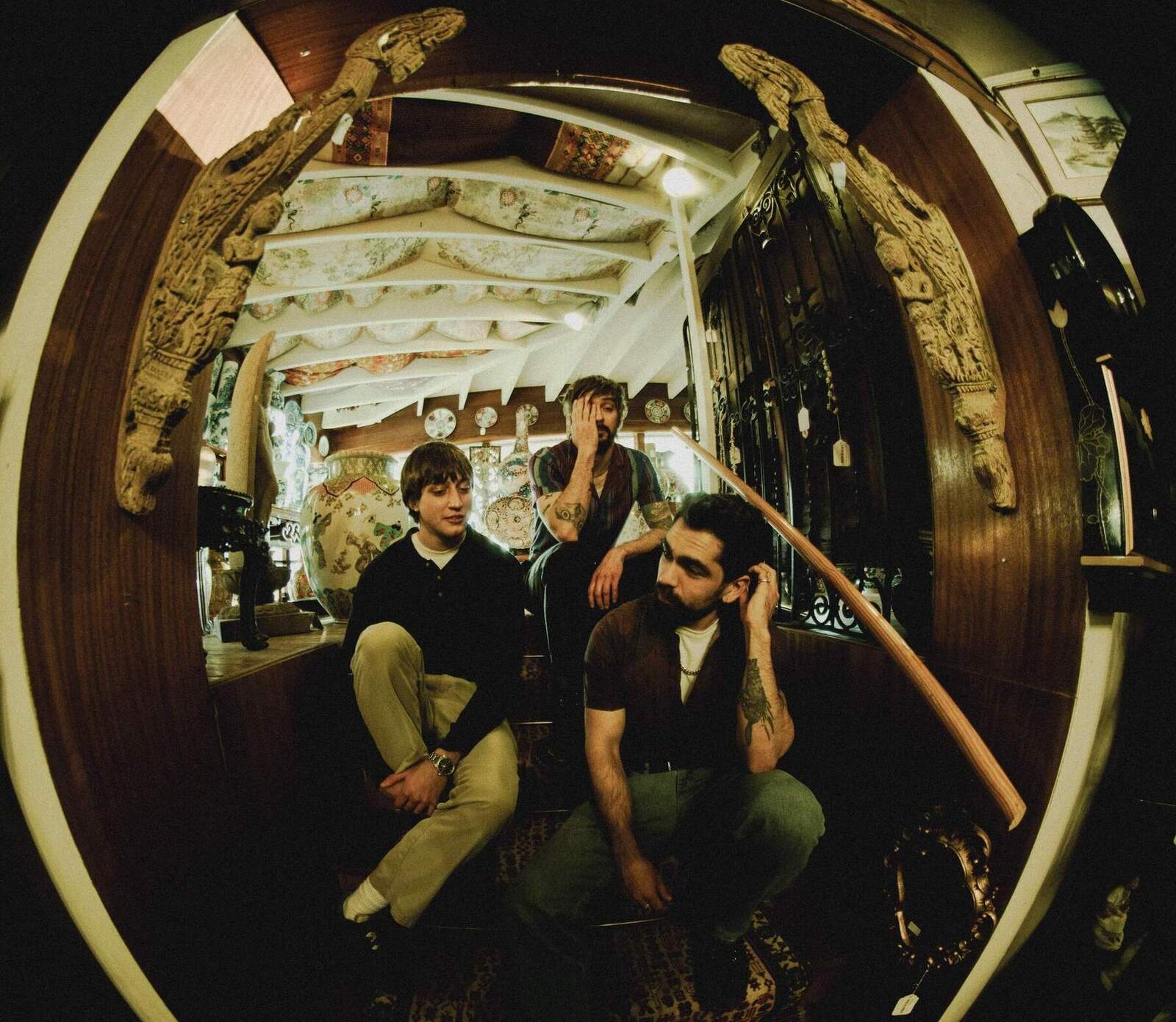The Grasshopper Lies Heavy interview with James Woodard Jared Flores, Mario Trejo and Eric Sandoval
© Andrew Vertiz
When you say The Grasshopper Lies Heavy to people it means a lot of different things. You’re talking about a band that’s been releasing material for the better part of a decade at this point, and material that really runs the gambit of genres I might add. From the early programmed drum beginnings of GUN to the luscious soundscapes and space rock of this year’s All Sadness, Grinning Into Flow. While there’s a thread that connects it all, it might only be visible to the keenest of eyes; nearly imperceptible to al but a select few. Spanning eight releases and as many years, The Grasshopper Lies Heavy may have produced their greatest work yet. The amalgamation of sounds found on the above mentioned All Sadness, Grinning Into Glow encapsulates nearly all of the aspects that have at one point or another defined The Grasshopper Lies Heavy’s sound, but has also taken the palette of sound to an entirely new level, not only elevating the sound but the listener along with it. The building ebb and flow of All Sadness draws the listener in from minute one and doesn’t let loose until the album’s done. Quiet reserved guitars that build and flutter before retreating back into their hiding places melt with the steady thud of the bass and throbbing heartbeat of the drums, sonic ephemera floating in the back like gossamer chains rattling in the wind, before building into a concrete wall of riff worshipping, amp destroying beauty in a cacophonous rage of sound. All Sadness, Grinning Into Flow is the beautiful soundtrack to a film that was once in the mind’s of the artists responsible for creating the album, but will inevitably be playing on a loop in your mind ever after. All Sadness might be their opus, but I’m not inclined to believe that. This is a band that’s been around for so long they have gone round the bend and come back again, they’re past the breaking point and they’re not going anywhere anytime soon. I’m inclined to believe they’re just going to keep learning and getting better and better. In fact, I shudder to even think what these guys are going to be up to five years from now. I don’t know what it will sound like, I don’t know what you will call it, but I know it’ll be good, I can tell you that, ha-ha! Enough of my inane pondering and pandering though, there’s a link below for you to sample the goods yourself, and make sure you do so as you won’t be disappointed! Every current member of The Grasshopper Lies Heavy took part in this comprehensive interview to provide you with an all-you-need-to-know guide to the band and their releases in this writer’s humble opinion. It should offer tidbits of new information to even the more veteran of fans, as well as effectively operate as a beginner’s guide to the kaleidoscope of sound that is The Grasshopper Lies Heavy, so with out further ado, bon appétit!
Listen while you read: http://thegrasshopperliesheavy.bandcamp.com/
I just recently
got into you guys and I only know enough to get me in trouble at this point
really. What’s the current lineup in The
Grasshopper Lies heavy at this point? Is
this the original lineup or have there been some changes since you all
started?
got into you guys and I only know enough to get me in trouble at this point
really. What’s the current lineup in The
Grasshopper Lies heavy at this point? Is
this the original lineup or have there been some changes since you all
started?
James Woodard – Guitar, Synth,
Noise Mario Trejo – Bass, Guitar,
Noise Eric Sandoval – Drums
Jared Flores –
Guitar, Bass, Synth
Guitar, Bass, Synth
James: The lineup has
changed quite a bit through the years, actually. Eric is our sixth drummer, but he’s been
around for a while now. Mario started in
2007 or ‘08. Jared is the newest guy; he
started on our tour in December.
changed quite a bit through the years, actually. Eric is our sixth drummer, but he’s been
around for a while now. Mario started in
2007 or ‘08. Jared is the newest guy; he
started on our tour in December.
Are any of you in
any other bands at this point or do you have any active side projects? Have you release any music with anyone in the
past? If so, can you tell us a bit about
that?
any other bands at this point or do you have any active side projects? Have you release any music with anyone in the
past? If so, can you tell us a bit about
that?
James: I’m in another
project called Blacknail, which is a scary impov modular synth/synth triggered
drums/broken guitar trio. It’s pretty
fun. Mario and I used to be in The
Islands and the Sea, which has a posthumous cassette out on Crowquill
Records. Eric and I were also in a Mega
Man cover band called MEGA MAN. There’s
some other stuff too, but I’ll stop now.
project called Blacknail, which is a scary impov modular synth/synth triggered
drums/broken guitar trio. It’s pretty
fun. Mario and I used to be in The
Islands and the Sea, which has a posthumous cassette out on Crowquill
Records. Eric and I were also in a Mega
Man cover band called MEGA MAN. There’s
some other stuff too, but I’ll stop now.
Jared: Yeah, I’m in a
couple others bands that are in the early stages. The Beers, Selfies, Life Decay and another
band with some of the same people from those other bands that doesn’t have a
name yet.
couple others bands that are in the early stages. The Beers, Selfies, Life Decay and another
band with some of the same people from those other bands that doesn’t have a
name yet.
Mario: As James said,
I was in Islands and The Sea with him a couple of years back. Every couple of years I’ll reunite with my
old band mates in Reader.
I was in Islands and The Sea with him a couple of years back. Every couple of years I’ll reunite with my
old band mates in Reader.
Eric: I’m in Ants.
How old are you
and where are you originally from?
and where are you originally from?
James: I’m
thirty. I’ve lived a few places, but San
Antonio is my home.
thirty. I’ve lived a few places, but San
Antonio is my home.
Jared: I’m twenty
four. With the exception of the brief
stint In Chicago I did a couple years back, I’ve lived in San Antonio my whole
life.
four. With the exception of the brief
stint In Chicago I did a couple years back, I’ve lived in San Antonio my whole
life.
Mario: I’m thirty
five, lived in Fat City, Texas my whole life.
five, lived in Fat City, Texas my whole life.
What was the local
music scene like where you grew up? Did
you see a lot of shows or were you very involved in that scene? Do you feel like it’s played a large or
important role in shaping your musical tastes or in the way that you perform at
this point?
music scene like where you grew up? Did
you see a lot of shows or were you very involved in that scene? Do you feel like it’s played a large or
important role in shaping your musical tastes or in the way that you perform at
this point?
James: The local
scene in San Antonio is pretty good.
There’s a lot of talent here.
People love to shit on it, but there’s some good stuff going on. It has its ups and downs. We kind of get overshadowed by Austin because
of its proximity. People usually get
recognized after they move.
scene in San Antonio is pretty good.
There’s a lot of talent here.
People love to shit on it, but there’s some good stuff going on. It has its ups and downs. We kind of get overshadowed by Austin because
of its proximity. People usually get
recognized after they move.
Jared: Over the past
year I’ve found that it’s a pretty cool scene.
year I’ve found that it’s a pretty cool scene.
Mario: Being the
elder in the band, I’ve seen the San Antonio and Austin scenes grow, change,
and get boring. Right now in San
Antonio, there’s a lot going on, with lots of genres. We do always get overlooked by our more
vegan/liberal friends in Austin, but I’m used to it. Austin can keep its’ weirdness, San Antonio
will keep its’ tacos.
elder in the band, I’ve seen the San Antonio and Austin scenes grow, change,
and get boring. Right now in San
Antonio, there’s a lot going on, with lots of genres. We do always get overlooked by our more
vegan/liberal friends in Austin, but I’m used to it. Austin can keep its’ weirdness, San Antonio
will keep its’ tacos.
What about your
home when you were growing up? Were any
of your parents or any of your close relatives musicians or maybe just
extremely interested/involved in music when you were a kid?
home when you were growing up? Were any
of your parents or any of your close relatives musicians or maybe just
extremely interested/involved in music when you were a kid?
James: My mom was
pretty supportive growing up when it came to me picking up a guitar. I think she just didn’t want me to blow up
the school, so a guitar was a good alternative.
pretty supportive growing up when it came to me picking up a guitar. I think she just didn’t want me to blow up
the school, so a guitar was a good alternative.
Jared: There really
wasn’t really any interest in other music for my parents than Kiss, old some
R&B and oldies type stuff.
wasn’t really any interest in other music for my parents than Kiss, old some
R&B and oldies type stuff.
Mario: My father
plays guitar and taught me when I was teenager.
He taught me church music at first, and eventually I expanded to other
music. I played with my father for about
ten years at church or for family functions.
The last time I played with him, we did Beatles covers for his sixtieth
birthday in front of all our family. It
was killer.
plays guitar and taught me when I was teenager.
He taught me church music at first, and eventually I expanded to other
music. I played with my father for about
ten years at church or for family functions.
The last time I played with him, we did Beatles covers for his sixtieth
birthday in front of all our family. It
was killer.
What do you
consider to be your first real exposure to music to be?
consider to be your first real exposure to music to be?
James: My mom always
had music on growing up, and my older brothers exposed me to stuff too. One of my older brothers would take acid and
smoke weed, and make me listen to Pink Floyd and Miami bass music.
had music on growing up, and my older brothers exposed me to stuff too. One of my older brothers would take acid and
smoke weed, and make me listen to Pink Floyd and Miami bass music.
Jared: I’d have to
say it was the mix of constantly blaring of Al Green and Kiss around the house;
didn’t care much for the latter, other than the distorted guitars.
say it was the mix of constantly blaring of Al Green and Kiss around the house;
didn’t care much for the latter, other than the distorted guitars.
Mario: My parents
used to play classical music to me when I was a child on a record player. Eventually my parents showed me The Beatles,
The Doors, and Chicago. My cousins got
me into the Miami Bass movement kinda how James’s brothers did. Funny, how for me, it’s still about how much
air can be pushed through multiple speakers
used to play classical music to me when I was a child on a record player. Eventually my parents showed me The Beatles,
The Doors, and Chicago. My cousins got
me into the Miami Bass movement kinda how James’s brothers did. Funny, how for me, it’s still about how much
air can be pushed through multiple speakers
If you were to
pick a moment that seemed to open your eyes up to the infinite possibilities of
music and changed everything for you, what would it be?
pick a moment that seemed to open your eyes up to the infinite possibilities of
music and changed everything for you, what would it be?
James: Probably
listening to Floyd when I was a kid and finally “getting it”. “Shine On You Crazy Diamond” comes to
mind. Also, seeing Fu Manchu when I was
eighteen was pretty important. Amps so
loud you felt them. Won’t ever forget
how that felt for the first time.
listening to Floyd when I was a kid and finally “getting it”. “Shine On You Crazy Diamond” comes to
mind. Also, seeing Fu Manchu when I was
eighteen was pretty important. Amps so
loud you felt them. Won’t ever forget
how that felt for the first time.
Jared: It would more
than likely be the moment I heard the songs “The Sound” and “Helpless Child”
from the Swans album Soundtracks For The Blind.
than likely be the moment I heard the songs “The Sound” and “Helpless Child”
from the Swans album Soundtracks For The Blind.
Mario: Watching Pink
Floyd Live in Pompeii on VHS was a game changer for me, listening to Jimi
Hendrix Live at the Monterey Pop Festival.
Just listening to a guitar destroying three full Marshall stacks and
realizing it was the late 60’s blew my mind.
Seeing Sonic Youth in ‘97 and a majority of the set list was stuff from
the 80’s was amazing. The crazy Branca
tunings messed with my head.
Floyd Live in Pompeii on VHS was a game changer for me, listening to Jimi
Hendrix Live at the Monterey Pop Festival.
Just listening to a guitar destroying three full Marshall stacks and
realizing it was the late 60’s blew my mind.
Seeing Sonic Youth in ‘97 and a majority of the set list was stuff from
the 80’s was amazing. The crazy Branca
tunings messed with my head.
When did you
decide that you wanted to start writing and performing your own music? What brought that decision about for you?
decide that you wanted to start writing and performing your own music? What brought that decision about for you?
James: I think it was
just a natural progression from learning to play guitar.
just a natural progression from learning to play guitar.
Mario: The moment I
was asked to start a band with one of my best friends. Eventually it became part of me.
was asked to start a band with one of my best friends. Eventually it became part of me.
What was your
first instrument? When and how did you
get it?
first instrument? When and how did you
get it?
James: An Epiphone
Flying V. Got it when I was fifteen.
Flying V. Got it when I was fifteen.
Jared: It was some
off-brand Strat copy.
off-brand Strat copy.
Mario: Acoustic
Yamaha guitar.
Yamaha guitar.
How did you all
meet and when would that have been?
meet and when would that have been?
James: I met Mario
thought the music scene. He was in some
pretty prolific bands around town, most notably Reader and Jupiter
Mission. Met Eric through his old
band. We met Jared through
Facebookspace.
thought the music scene. He was in some
pretty prolific bands around town, most notably Reader and Jupiter
Mission. Met Eric through his old
band. We met Jared through
Facebookspace.
Jared: Yeah, I saw
that these dudes needed a bass fill-in, so I just went for it and asked.
that these dudes needed a bass fill-in, so I just went for it and asked.
Mario: I met James at
shows, hung out with him at record stores.
We played shows together before we were in the same band.
shows, hung out with him at record stores.
We played shows together before we were in the same band.
When did The
Grasshopper Lies Heavy form and what exactly led to that?
Grasshopper Lies Heavy form and what exactly led to that?
James: I started the
band in ‘05 or ’06; did the first few releases with a drum machine. I was just writing songs in my room during my
early years in college, before I really knew any other good musicians.
band in ‘05 or ’06; did the first few releases with a drum machine. I was just writing songs in my room during my
early years in college, before I really knew any other good musicians.
Is there any sort
of creed, code, ideal or mantra that the band shares or lives by?
of creed, code, ideal or mantra that the band shares or lives by?
Eric: Don’t suck.
James: Ha-ha-ha-ha,
yeah.
yeah.
Let’s take two
seconds to talk a little bit about the name.
I like it, but I get the sneaking suspicion that I’m missing out on
something. Like, either it’s a reference
to something I’m not catching or some sort of inside thing. What does the name mean or refer to? Who came up with it and how did you all go
about choosing it? Can you recall any
close seconds that you almost went with?
seconds to talk a little bit about the name.
I like it, but I get the sneaking suspicion that I’m missing out on
something. Like, either it’s a reference
to something I’m not catching or some sort of inside thing. What does the name mean or refer to? Who came up with it and how did you all go
about choosing it? Can you recall any
close seconds that you almost went with?
James: The name is a
reference to the Philip K. Dick book The Man in the High Castle. Check it out!
reference to the Philip K. Dick book The Man in the High Castle. Check it out!
Now, where is The
Grasshopper Lies Heavy located at this point?
Grasshopper Lies Heavy located at this point?
The Grasshopper Lies Heavy:
San Antonio, Texas.
San Antonio, Texas.
Do you feel like
you’re very involved in the local scene?
Do you book or attend a lot of local shows or anything?
you’re very involved in the local scene?
Do you book or attend a lot of local shows or anything?
James: I book shows
every once in a while, and host bands that come through occasionally, too.
every once in a while, and host bands that come through occasionally, too.
Jared: Didn’t use to,
but now I go to a couple shows here and there.
but now I go to a couple shows here and there.
Mario: I have been
going to shows on and off since I was seventeen in the late 90’s. I’m not as involved now, but for a while
there I was at a show every night.
going to shows on and off since I was seventeen in the late 90’s. I’m not as involved now, but for a while
there I was at a show every night.
Are you involved
in recording or releasing any music other than your own? If so, can you tell us about that briefly
here?
in recording or releasing any music other than your own? If so, can you tell us about that briefly
here?
Jared: While in
Chicago I was part of a co-op type of label and we released some pretty cool
drone/psych/dream pop stuff, but the defacto “leader” and I had a falling out
when he wouldn’t send me some stuff that I had mistakenly shipped there after
my move back to Texas.
Chicago I was part of a co-op type of label and we released some pretty cool
drone/psych/dream pop stuff, but the defacto “leader” and I had a falling out
when he wouldn’t send me some stuff that I had mistakenly shipped there after
my move back to Texas.
In your opinion,
has the local scene played an integral role in the formation, sound, history or
evolution of The Grasshopper Lies Heavy?
Or, do you feel like you could be doing what you’re doing and loud like
you do regardless of where you were at or what you were surrounded by and
stuff?
has the local scene played an integral role in the formation, sound, history or
evolution of The Grasshopper Lies Heavy?
Or, do you feel like you could be doing what you’re doing and loud like
you do regardless of where you were at or what you were surrounded by and
stuff?
James: Regardless of
geographical location, I’d be doing what I am doing. Now, is the psychosphere of South Texas
influential on the music we make?
Maybe. Probably. But I don’t think it has to do directly with
local music itself. It’s great to have a
local scene to cultivate, with killer local bands and venues. But it doesn’t reflect on our songwriting
process.
geographical location, I’d be doing what I am doing. Now, is the psychosphere of South Texas
influential on the music we make?
Maybe. Probably. But I don’t think it has to do directly with
local music itself. It’s great to have a
local scene to cultivate, with killer local bands and venues. But it doesn’t reflect on our songwriting
process.
Mario: I would be
doing this regardless of where I was. I
think being in San Antonio makes you humble.
If you can tough it out for five years in San Antonio, you can make it
anywhere.
doing this regardless of where I was. I
think being in San Antonio makes you humble.
If you can tough it out for five years in San Antonio, you can make it
anywhere.
Okay, so whenever
I do these interviews I inevitably have to describe how a band sounds to our
readers who may never have heard them before, and sometime more so than others,
it’s really hard to do it right. It’s
quickly becoming this kind of neurosis for me, seriously. Sometimes it keeps me up late at night,
wondering if I’ve mucked something up and put too many of my own thoughts and
perceptions into the music. Rather than
giving me an ulcer, how would you describe The Grasshopper Lies Heavy’s sound
to our readers who may never have heard you all before in your own words?
I do these interviews I inevitably have to describe how a band sounds to our
readers who may never have heard them before, and sometime more so than others,
it’s really hard to do it right. It’s
quickly becoming this kind of neurosis for me, seriously. Sometimes it keeps me up late at night,
wondering if I’ve mucked something up and put too many of my own thoughts and
perceptions into the music. Rather than
giving me an ulcer, how would you describe The Grasshopper Lies Heavy’s sound
to our readers who may never have heard you all before in your own words?
James: Yeah, this is
hard for me too. The band kind of has
two sides to it. The first side is a
heavy, chunky, mosh pit inducing, sludgy, doomy, metal thing. And the second side is a more heavy,
psychedelic, synthy, soundtracky thing.
hard for me too. The band kind of has
two sides to it. The first side is a
heavy, chunky, mosh pit inducing, sludgy, doomy, metal thing. And the second side is a more heavy,
psychedelic, synthy, soundtracky thing.
Speaking of
describing sounds, you all have any extraordinarily interesting combination of
influences that seems to be rather eclectic and all encompassing in a lot of
ways. I’m really curious, who are some
of your major musical influences? What
about influences on the bands as a whole rather than just individually?
describing sounds, you all have any extraordinarily interesting combination of
influences that seems to be rather eclectic and all encompassing in a lot of
ways. I’m really curious, who are some
of your major musical influences? What
about influences on the bands as a whole rather than just individually?
James: A lot of
horror and sci-fi synth soundtracks, John Carpenter, Vangelis, Goblin,
Morricone, stuff like that. Also the
guitarist Steven R. Smith and the kraut band Popol Vuh is pretty important;
Floyd too.
horror and sci-fi synth soundtracks, John Carpenter, Vangelis, Goblin,
Morricone, stuff like that. Also the
guitarist Steven R. Smith and the kraut band Popol Vuh is pretty important;
Floyd too.
Jared: I agree with
James on the importance of Popol Vuh; been really obsessed with Steven R. Smith
again lately, too. I don’t think that’ll
ever be a bad thing.
James on the importance of Popol Vuh; been really obsessed with Steven R. Smith
again lately, too. I don’t think that’ll
ever be a bad thing.
Mario: Floyd,
Sabbath, Zombi, Goblin, yeah I think we’re all on the same page here. Ha-ha.
Sabbath, Zombi, Goblin, yeah I think we’re all on the same page here. Ha-ha.
Eric: Nobuo Uematsu,
amongst many other video game composers.
amongst many other video game composers.
What’s the
songwriting process like for The Grasshopper Lies Heavy? Is there someone who usually comes to the
rest of the band with a riff or more finished idea to work out and compose with
the rest of you all, or do you all get together and just kind of kick ideas
back and forth and jam until you distill and polish something that you want to
work on further from the exchange between members?
songwriting process like for The Grasshopper Lies Heavy? Is there someone who usually comes to the
rest of the band with a riff or more finished idea to work out and compose with
the rest of you all, or do you all get together and just kind of kick ideas
back and forth and jam until you distill and polish something that you want to
work on further from the exchange between members?
James: I usually
bring riffs to practice and we play with ‘em and turn ‘em into songs.
bring riffs to practice and we play with ‘em and turn ‘em into songs.
What about
recording? It think that most musicians
at least, can appreciate all the time and work that goes into recording an
album when they’re holding that finished product in their hands. But actually getting to that point getting
everything recorded and sounding right, and especially doing that as a band,
can be extremely difficult to say the least.
What’s it like recording for The Grasshopper Lies Heavy?
recording? It think that most musicians
at least, can appreciate all the time and work that goes into recording an
album when they’re holding that finished product in their hands. But actually getting to that point getting
everything recorded and sounding right, and especially doing that as a band,
can be extremely difficult to say the least.
What’s it like recording for The Grasshopper Lies Heavy?
James: Yeah,
recording is a challenging process for us.
Not so much in the tracking, but in the mixing department. I was very particular on the new album
especially. We finished principal
tracking in two or three days, mixing took much longer.
recording is a challenging process for us.
Not so much in the tracking, but in the mixing department. I was very particular on the new album
especially. We finished principal
tracking in two or three days, mixing took much longer.
Mario: I used to
loathe recording, but after this last record I’ve started enjoying it a lot
more.
loathe recording, but after this last record I’ve started enjoying it a lot
more.
Do you all spend a
lot of time working out the structures of songs before you lay them down and
record them? Or, is it more of a case
where you get a good skeletal idea of what a song’s going to sound like and
then allow it some room to change and evolved where necessary during the
recording process?
lot of time working out the structures of songs before you lay them down and
record them? Or, is it more of a case
where you get a good skeletal idea of what a song’s going to sound like and
then allow it some room to change and evolved where necessary during the
recording process?
James: We pretty much
know exactly what we want to do when we hit the studio, except guitar solos and
stuff like that.
know exactly what we want to do when we hit the studio, except guitar solos and
stuff like that.
Do you all utilize
any psychoactive or hallucinogenic drugs in the songwriting, recording or
performance aspects of The Grasshopper Lies Heavy? A lot of people like to use the altered
states that drugs create to make their art in a different or slightly skewed
way and I’m always curious about it.
any psychoactive or hallucinogenic drugs in the songwriting, recording or
performance aspects of The Grasshopper Lies Heavy? A lot of people like to use the altered
states that drugs create to make their art in a different or slightly skewed
way and I’m always curious about it.
James: I always
perform sober. I like to keep my wits
about me. Some of the dudes toke in
their free time though. No names. We’re grownups.
perform sober. I like to keep my wits
about me. Some of the dudes toke in
their free time though. No names. We’re grownups.
Jared: I’m of the
mind that people tend to make some of the best music when they’re sober. Then again, I’m always sober.
mind that people tend to make some of the best music when they’re sober. Then again, I’m always sober.
Mario: I don’t drink
at our shows ‘til after we play, and even at that I’m tired and I just want
water and tacos. I also tend to play
really sloppy when drunk.
at our shows ‘til after we play, and even at that I’m tired and I just want
water and tacos. I also tend to play
really sloppy when drunk.
In 2006 you all
self-released the self-titled The Grasshopper Lies Heavy CD limited to only
1,000 copies. Can you talk a little bit
about the recording of the material for that first release? Was it a fun, pleasurable experience for you
all? When and where was that
recorded? Who recorded it? What kind of equipment was used?
self-released the self-titled The Grasshopper Lies Heavy CD limited to only
1,000 copies. Can you talk a little bit
about the recording of the material for that first release? Was it a fun, pleasurable experience for you
all? When and where was that
recorded? Who recorded it? What kind of equipment was used?
James: Oh gosh, I
never even think about this record anymore.
Someone in Conway, Arizona requested one of the songs on this record on
our last tour, and that was kinda crazy to me, because I can’t even tell you
how that song goes! The first EP was
basically songs I wrote messing around with a laptop. I didn’t really know many other people, so it
was just me and a bass player, and the laptop did the drums.
never even think about this record anymore.
Someone in Conway, Arizona requested one of the songs on this record on
our last tour, and that was kinda crazy to me, because I can’t even tell you
how that song goes! The first EP was
basically songs I wrote messing around with a laptop. I didn’t really know many other people, so it
was just me and a bass player, and the laptop did the drums.
You all followed
up the Self-Titled CD with the completely bonkers GUN EP on the Forgotten
Empire records label which has an interesting story to it, at least in my
opinion. The CD has like fifty-four
tracks on it and the six songs on it are all placed in between these beeps and
weird sounds and stuff, all of which are named after parts of a revolver
handgun which is all laid out in the artwork for the digipak. Can you tell us a little bit about how GUN
came to be? What was the initial idea
behind the album? Was the recording of
the material for GUN very different than your earlier Self-Titled release? Who recorded that material and where was that
at? When would that have been? What kind of equipment was used?
up the Self-Titled CD with the completely bonkers GUN EP on the Forgotten
Empire records label which has an interesting story to it, at least in my
opinion. The CD has like fifty-four
tracks on it and the six songs on it are all placed in between these beeps and
weird sounds and stuff, all of which are named after parts of a revolver
handgun which is all laid out in the artwork for the digipak. Can you tell us a little bit about how GUN
came to be? What was the initial idea
behind the album? Was the recording of
the material for GUN very different than your earlier Self-Titled release? Who recorded that material and where was that
at? When would that have been? What kind of equipment was used?
James: GUN was more
of the guitar, bass, laptop duo era, so the songwriting and recording were very
similar. Yeah, the beeps thing. I don’t know what I was thinking with that,
other than CDs being boring. We recorded
this one, along with the self-titled and Soft Noise albums, at a little studio
called Electro with our friend Justin Morris.
Morris is an incredibly talented cat, and since running Electro, he’s
relocated to Austin and founded Western Dynamo, a pro audio gear company which
sells his beautiful compressor he designed from the ground up. He also records in much nicer studios
now. We might record our next album with
him, straight to 2” tape.
of the guitar, bass, laptop duo era, so the songwriting and recording were very
similar. Yeah, the beeps thing. I don’t know what I was thinking with that,
other than CDs being boring. We recorded
this one, along with the self-titled and Soft Noise albums, at a little studio
called Electro with our friend Justin Morris.
Morris is an incredibly talented cat, and since running Electro, he’s
relocated to Austin and founded Western Dynamo, a pro audio gear company which
sells his beautiful compressor he designed from the ground up. He also records in much nicer studios
now. We might record our next album with
him, straight to 2” tape.
In 2008 you
released your third EP in three years, Soft Noise again for Forgotten Empire
records. Now I don’t know if I heard
this correctly but from what I’ve heard all of that material was written and
recorded in one day? How did that all
come about and what led to the release of that material, or had that kind of
been the initial idea all along? When
was that material recorded? Where was
that at and when would that have been?
What kind of equipment was used that time around?
released your third EP in three years, Soft Noise again for Forgotten Empire
records. Now I don’t know if I heard
this correctly but from what I’ve heard all of that material was written and
recorded in one day? How did that all
come about and what led to the release of that material, or had that kind of
been the initial idea all along? When
was that material recorded? Where was
that at and when would that have been?
What kind of equipment was used that time around?
James: I think it was
in ‘06 or ‘07. I bought a Hammond Organ
from the Salvation Army and decided to bring it to Electro to experiment
with. Morris and I miced it up a few
ways and experimented with it for a few hours.
After recording, we boiled it down to a fifteen minute edit. It was a fun day. The label at the time wanted to put it out,
so it happened. It’s super out of print,
along with the other Forgotten Empire era stuff. I’m not even sure if I have a physical copy
anymore.
in ‘06 or ‘07. I bought a Hammond Organ
from the Salvation Army and decided to bring it to Electro to experiment
with. Morris and I miced it up a few
ways and experimented with it for a few hours.
After recording, we boiled it down to a fifteen minute edit. It was a fun day. The label at the time wanted to put it out,
so it happened. It’s super out of print,
along with the other Forgotten Empire era stuff. I’m not even sure if I have a physical copy
anymore.
2013 saw the birth
of two new tracks, “Sucker” and “Dead Songs for Dead Bands” which were released
on the In Love split single with God Townes on the Texas Is Funny label and
limited to only 300 copies. Were
“Sucker” or “Dead Songs for Dead Bands” written or recorded specifically for
this single or had they been around for a while looking for a place to call
home? If they were recorded for the
single, can you tell us about the recording of them? You probably know the drill by now, ha-ha,
but who, what, where, when and how?
of two new tracks, “Sucker” and “Dead Songs for Dead Bands” which were released
on the In Love split single with God Townes on the Texas Is Funny label and
limited to only 300 copies. Were
“Sucker” or “Dead Songs for Dead Bands” written or recorded specifically for
this single or had they been around for a while looking for a place to call
home? If they were recorded for the
single, can you tell us about the recording of them? You probably know the drill by now, ha-ha,
but who, what, where, when and how?
James: We had
“Sucker” already written, and “Dead Songs for Dead Bands” was a heavily
modified version of an Islands and the Sea song; one of James and Mario
previous bands. They came together
pretty quick. We recorded these songs,
along with another song, over a single day during Christmas vacation. We recorded the songs with longtime friend
Bob Catlin, who has been around the world with bands like Pigface and Psychic
TV. He also recorded the 2011 album,
Every Man For Himself and God Against All and our new album, All Sadness,
Grinning into Flow.
“Sucker” already written, and “Dead Songs for Dead Bands” was a heavily
modified version of an Islands and the Sea song; one of James and Mario
previous bands. They came together
pretty quick. We recorded these songs,
along with another song, over a single day during Christmas vacation. We recorded the songs with longtime friend
Bob Catlin, who has been around the world with bands like Pigface and Psychic
TV. He also recorded the 2011 album,
Every Man For Himself and God Against All and our new album, All Sadness,
Grinning into Flow.
You recently
released the All Sadness, Grinning Into Flow 12” for Learning Curve
Records. Was the recording of the
material for All Sadness very different than the sessions for your earlier
material? Can you tell me a little bit
about the recording of that material?
Where was it recorded and who recorded it? When would that have been? What kind of equipment was used? Is the LP limited at all? If so, do you know how many copies it’s
limited to?
released the All Sadness, Grinning Into Flow 12” for Learning Curve
Records. Was the recording of the
material for All Sadness very different than the sessions for your earlier
material? Can you tell me a little bit
about the recording of that material?
Where was it recorded and who recorded it? When would that have been? What kind of equipment was used? Is the LP limited at all? If so, do you know how many copies it’s
limited to?
James: Principal
tracking was finished really fast; Eric finished the drums on the first day,
then Mario finished bass on the next day.
We also had an arrangement for strings and horns recorded by a pal,
Marcus Rubio, for us at Cal Arts, so we had to mix those tracks in as
well. Then the overdubbing, mostly dual
guitars and synths. As previously
mentioned, the mixing took the longest.
I was pretty particular about it.
We recorded it at our friend Bob Catlin’s house, who recorded,
engineered, and mixed it. The LP is
limited to 300 copies, 100 in each color.
Some of the color variations are really close to selling out.
tracking was finished really fast; Eric finished the drums on the first day,
then Mario finished bass on the next day.
We also had an arrangement for strings and horns recorded by a pal,
Marcus Rubio, for us at Cal Arts, so we had to mix those tracks in as
well. Then the overdubbing, mostly dual
guitars and synths. As previously
mentioned, the mixing took the longest.
I was pretty particular about it.
We recorded it at our friend Bob Catlin’s house, who recorded,
engineered, and mixed it. The LP is
limited to 300 copies, 100 in each color.
Some of the color variations are really close to selling out.
Does The
Grasshopper Lies Heavy have any music we haven’t talked about yet, maybe a song
on a compilation, single or a demo that I might not know about?
Grasshopper Lies Heavy have any music we haven’t talked about yet, maybe a song
on a compilation, single or a demo that I might not know about?
James: We did a split
with Hawks from Atlanta called Fluffer, and we had an album in 2011 called
Every Man for Himself and God Against All, which was out of print for a few
years until Crowquill Records wanted to reissue it on vinyl. The reissue just came out, and it’s gorgeous.
with Hawks from Atlanta called Fluffer, and we had an album in 2011 called
Every Man for Himself and God Against All, which was out of print for a few
years until Crowquill Records wanted to reissue it on vinyl. The reissue just came out, and it’s gorgeous.
Where’s the best
place for our US readers to pick up copies of your stuff?
place for our US readers to pick up copies of your stuff?
James: At shows, or
directly through our record labels’ websites.
directly through our record labels’ websites.
With the
completely insane international shipping rates that just seem to keep going up
and up, I try and provide our readers with as many possible options for picking
up imports as I can. Where’s the best
place for our international and overseas readers to score your stuff?
completely insane international shipping rates that just seem to keep going up
and up, I try and provide our readers with as many possible options for picking
up imports as I can. Where’s the best
place for our international and overseas readers to score your stuff?
James: I think our
label Learning Curve has Euro distro.
Poke around!
label Learning Curve has Euro distro.
Poke around!
And where would
the best place for our interested readers to keep up with the latest news from
The Grasshopper Lies Heavy like upcoming shows and album releases at?
the best place for our interested readers to keep up with the latest news from
The Grasshopper Lies Heavy like upcoming shows and album releases at?
James:
Facebooktwitterinstagram is a great place!
Facebooktwitterinstagram is a great place!
Are there any
major plans or goals that you’re looking to accomplish in the rest of 2014 or
2015?
major plans or goals that you’re looking to accomplish in the rest of 2014 or
2015?
James: We’ve been on
the road a bunch this year. This fall I want to write a new album and record it
live to tape. That’d kick ass.
the road a bunch this year. This fall I want to write a new album and record it
live to tape. That’d kick ass.
Jared: Really looking
forward to recording with these dudes.
forward to recording with these dudes.
Mario: I’m stoked on
recording again. Gonna be great with all four of us there.
recording again. Gonna be great with all four of us there.
Do you all spend a
lot of time out on the road touring and stuff?
Do you enjoy being out on the road?
What’s life like on tour for The Grasshopper Lies Heavy?
lot of time out on the road touring and stuff?
Do you enjoy being out on the road?
What’s life like on tour for The Grasshopper Lies Heavy?
James: We’ve spent
about a month on the road this year; two weeks over Christmas and New Years,
and two and a half weeks this summer.
Touring’s fun, but it definitely has its ups and downs. Meeting people and playing with amazing bands
makes up for all the bullshit you have to deal with though. Best times.
about a month on the road this year; two weeks over Christmas and New Years,
and two and a half weeks this summer.
Touring’s fun, but it definitely has its ups and downs. Meeting people and playing with amazing bands
makes up for all the bullshit you have to deal with though. Best times.
Jared: I love it.
Mario: I wish I could
tour more. Working on it!
tour more. Working on it!
What, if anything,
do you all have planned as far as touring goes for the rest of 2014? I know as I write this you all are out on the
road actually but I don’t know if you all have anything else planned for the
rest of the year.
do you all have planned as far as touring goes for the rest of 2014? I know as I write this you all are out on the
road actually but I don’t know if you all have anything else planned for the
rest of the year.
James: We’re going to
do some weekend warrior stuff here and there, but I want to concentrate on
writing and recording some new music for the rest of the year.
do some weekend warrior stuff here and there, but I want to concentrate on
writing and recording some new music for the rest of the year.
Who are some of
your personal favorite bands that you’ve had a chance to share a bill with over
the past few years?
your personal favorite bands that you’ve had a chance to share a bill with over
the past few years?
James: Torche and
Coliseum come to mind. More recently,
we’ve played with a bunch of killer bands on tour, such as Gay Witch Abortion,
Wymyns Prysyn, Pretty Please, Lechuguillas, Glassing… Gosh, there are too many to remember.
Coliseum come to mind. More recently,
we’ve played with a bunch of killer bands on tour, such as Gay Witch Abortion,
Wymyns Prysyn, Pretty Please, Lechuguillas, Glassing… Gosh, there are too many to remember.
Jared: I haven’t been
in the band long, but sharing stages with Gay Witch Abortion, Wymyns Prysyn and
Ghost Police have been highlights for me.
in the band long, but sharing stages with Gay Witch Abortion, Wymyns Prysyn and
Ghost Police have been highlights for me.
Mario: Torche, Hawks,
Wymyns Prysn, Glassing, and so many I can’t remember either…
Wymyns Prysn, Glassing, and so many I can’t remember either…
In your dreams,
who are you on tour with?
who are you on tour with?
James: The Torche
guys are super nice dudes. They’d
probably be a blast to share the road with. Melvins. Boris.
Goblin. Zombi. Nine Inch Nails.
guys are super nice dudes. They’d
probably be a blast to share the road with. Melvins. Boris.
Goblin. Zombi. Nine Inch Nails.
Jared: What James
said.
said.
Do you have any
funny or interesting stories from live shows or performances that you’d like to
share here with our readers?
funny or interesting stories from live shows or performances that you’d like to
share here with our readers?
James: There are so
many. On this last tour, in Conway,
Arizona, this guy opening for us had been on tour about six weeks, and had
really bad strep throat. He drives up
after staying in the hospital all day high as fuck on codeine. He wears a blue onesie onstage, berates the
crowd in between songs, and sings songs about how smoking cigarettes is
cool. He was high as fuck, telling kids
“Who the fuck are you people? What kind of people live in this town? I drove up to this building and just knew
this show would suck. This is
hell!”. It was incredible. I almost died laughing.
many. On this last tour, in Conway,
Arizona, this guy opening for us had been on tour about six weeks, and had
really bad strep throat. He drives up
after staying in the hospital all day high as fuck on codeine. He wears a blue onesie onstage, berates the
crowd in between songs, and sings songs about how smoking cigarettes is
cool. He was high as fuck, telling kids
“Who the fuck are you people? What kind of people live in this town? I drove up to this building and just knew
this show would suck. This is
hell!”. It was incredible. I almost died laughing.
Jared: That dude in
Conway, Arizona was hilarious! On our
last tour, we managed to land a show on New Years Eve in Clarksville,
Tennessee. Us and the dudes in Ghost
Police ended up playing to a bunch of college kids high on acid and dressed in
their spirit animal attire. They just
kind of sat at the tables and were probably wondering what was going on.
Conway, Arizona was hilarious! On our
last tour, we managed to land a show on New Years Eve in Clarksville,
Tennessee. Us and the dudes in Ghost
Police ended up playing to a bunch of college kids high on acid and dressed in
their spirit animal attire. They just
kind of sat at the tables and were probably wondering what was going on.
Mario: That one band
with the “Cesspool” song was a trip in Houston.
with the “Cesspool” song was a trip in Houston.
Do you all give a
lot of thought to the visual aspects that represent the band to a large extent,
stuff like flyers, posters, shirt designs, logos and covers? Is there any kind of meaning or message that
you’re trying to convey with your art?
Do you have anyone that you usually turn to in your times of need when
it comes to that kind of thing? If so,
who is that and how did you get hooked up with them?
lot of thought to the visual aspects that represent the band to a large extent,
stuff like flyers, posters, shirt designs, logos and covers? Is there any kind of meaning or message that
you’re trying to convey with your art?
Do you have anyone that you usually turn to in your times of need when
it comes to that kind of thing? If so,
who is that and how did you get hooked up with them?
James: In terms of
merch, I design most of it. I screen
print everything myself, or with my girlfriend.
For album covers, we always use local artists whose work I admire. We’ve used artists such as Meghan Fest,
Michael Velliquette, Nicholas Hay, Linda Arredondo, and Underbelly Printing for
our artwork. As an artist and art
teacher, artwork is really important in the band, especially album art. In terms of messages in the artwork, I think
the new album has a kind of dark, southern Occult mysticism to it, which I
think goes hand in hand with the music.
merch, I design most of it. I screen
print everything myself, or with my girlfriend.
For album covers, we always use local artists whose work I admire. We’ve used artists such as Meghan Fest,
Michael Velliquette, Nicholas Hay, Linda Arredondo, and Underbelly Printing for
our artwork. As an artist and art
teacher, artwork is really important in the band, especially album art. In terms of messages in the artwork, I think
the new album has a kind of dark, southern Occult mysticism to it, which I
think goes hand in hand with the music.
With all of the
various methods of release that are available to musicians today I’m always
curious why they choose and prefer the various mediums that they do. Do you have a preferred medium of release for
your own music? What about when you’re
listening to and or purchasing music? If
you do have a preference, can you talk a little bit about why?
various methods of release that are available to musicians today I’m always
curious why they choose and prefer the various mediums that they do. Do you have a preferred medium of release for
your own music? What about when you’re
listening to and or purchasing music? If
you do have a preference, can you talk a little bit about why?
James: I prefer vinyl
over anything else. I’m also big on
cassettes. I’ve got a pretty sweet
record and tape collection. I recently
got a CD player from Goodwill, so I’ve been playing some older CDs too. I rarely buy CDs though; I try to keep it
analog when I can.
over anything else. I’m also big on
cassettes. I’ve got a pretty sweet
record and tape collection. I recently
got a CD player from Goodwill, so I’ve been playing some older CDs too. I rarely buy CDs though; I try to keep it
analog when I can.
Jared: I prefer vinyl
and cassettes.
and cassettes.
Mario: I’m getting
back into vinyl and cassettes. I’m not a
huge collector though.
back into vinyl and cassettes. I’m not a
huge collector though.
Do you have a
music collection at all? If you do, can
you tell us a little bit about it?
music collection at all? If you do, can
you tell us a little bit about it?
James: I’ve got a fairly
large vinyl collection. Mostly modern
stuff, and a lot of movie soundtracks.
large vinyl collection. Mostly modern
stuff, and a lot of movie soundtracks.
I grew up around a
pretty big collection of music and my dad was constantly picking me up anything
that I thought sounded cool from the local shops when I was a kid. I would kick back with a set of headphones,
read the liner notes, stare at the cover and just let the whole thing carry me
off on this trip, man! There was
something magical about having a physical object to hold an experience along
with the music that always made for a more complete listening experience, at
least for me. Do you have any such
connection with physically released music?
pretty big collection of music and my dad was constantly picking me up anything
that I thought sounded cool from the local shops when I was a kid. I would kick back with a set of headphones,
read the liner notes, stare at the cover and just let the whole thing carry me
off on this trip, man! There was
something magical about having a physical object to hold an experience along
with the music that always made for a more complete listening experience, at
least for me. Do you have any such
connection with physically released music?
James: Yeah, my mom
has a pretty cool record collection. I
remember when I was a kid I copied her Sabbath I album to a cassette and
listened to it on my boombox a lot. She
also had Dark Side Of The Moon on vinyl, and that was pretty important. I remember the feeling of being awestruck
looking at gatefold album covers by Yes and Floyd, along with the triple-fold
Woodstock record and all that shit. I’ve
always loved albums.
has a pretty cool record collection. I
remember when I was a kid I copied her Sabbath I album to a cassette and
listened to it on my boombox a lot. She
also had Dark Side Of The Moon on vinyl, and that was pretty important. I remember the feeling of being awestruck
looking at gatefold album covers by Yes and Floyd, along with the triple-fold
Woodstock record and all that shit. I’ve
always loved albums.
Digital music is
here, and it’s here in a big way.
Digital music is just the tip of the iceberg, though. When you combine it with the internet that’s
when things get really crazy. Together
they’ve exposed people to the literal world of music that they’re surrounded
by, allowed an unparalleled level of communication and eradicated a lot of
bands that are related to geography that would have crippled a band even a few
years ago. On the other hand though,
while people maybe exposed to more music than ever they’re not necessarily
interested in paying for it and illegal piracy is running rampant right
now. As an artist during the reign of
the digital era, what’s your opinion on digital music and distribution?
here, and it’s here in a big way.
Digital music is just the tip of the iceberg, though. When you combine it with the internet that’s
when things get really crazy. Together
they’ve exposed people to the literal world of music that they’re surrounded
by, allowed an unparalleled level of communication and eradicated a lot of
bands that are related to geography that would have crippled a band even a few
years ago. On the other hand though,
while people maybe exposed to more music than ever they’re not necessarily
interested in paying for it and illegal piracy is running rampant right
now. As an artist during the reign of
the digital era, what’s your opinion on digital music and distribution?
James: It’s a
blessing and a curse. It’s good because
anyone can hear you. We get Swedish kids
liking us on Facebook. A negative is
that anyone can put their music up, and there sure is a lot of mediocre shit
out there, so the market is kinda oversaturated right now. Labels are still viable because they wade
through the shite and curate a roster.
It’s like throwing an art show.
If you like one band on a label, there’s a good chance that you’ll like
a few more too.
blessing and a curse. It’s good because
anyone can hear you. We get Swedish kids
liking us on Facebook. A negative is
that anyone can put their music up, and there sure is a lot of mediocre shit
out there, so the market is kinda oversaturated right now. Labels are still viable because they wade
through the shite and curate a roster.
It’s like throwing an art show.
If you like one band on a label, there’s a good chance that you’ll like
a few more too.
I try to keep up with
as many good bands as I possibly can. Is
there anyone from your local scene or area that I should be listening to I
might not have heard of before?
as many good bands as I possibly can. Is
there anyone from your local scene or area that I should be listening to I
might not have heard of before?
James: There’s a
bunch of great shit in South Texas.
Since this is a psych based mag, you should definitely check out the
band Sungod, and their member Michael Sharp’s solo stuff; super cool.
bunch of great shit in South Texas.
Since this is a psych based mag, you should definitely check out the
band Sungod, and their member Michael Sharp’s solo stuff; super cool.
Mario: Check out Mike
Sharp’s stuff for sure. Last two albums
are on constant rotation at my place.
Sharp’s stuff for sure. Last two albums
are on constant rotation at my place.
What about
nationally and internationally?
nationally and internationally?
James: I can
recommend you some great horror films.
recommend you some great horror films.
Thanks for taking
the time to talk to me, it was awesome learning so much about the band and I
hope you all at least had some fun looking back on everything you’ve done and
managed to accomplish as a band. I swear
I’m done with my question, but before we call it a day I’d like to open the
floor up to you for a moment. Is there
anything that I could have possibly missed or that you’d just like to take this
opportunity to talk to me or the readers about?
the time to talk to me, it was awesome learning so much about the band and I
hope you all at least had some fun looking back on everything you’ve done and
managed to accomplish as a band. I swear
I’m done with my question, but before we call it a day I’d like to open the
floor up to you for a moment. Is there
anything that I could have possibly missed or that you’d just like to take this
opportunity to talk to me or the readers about?
James: Yeah, thanks
for reading. Definitely check out our
new album on Learning Curve Records and get that shit on vinyl. Also, Crowquill Records just reissued our
album from 2011 on vinyl, so get that too.
We’re really proud of these vinyl releases, they’re both beautiful and
these labels deserve your hard-earned chump change. And find us on the internet. And come to a show! Free hugs!
for reading. Definitely check out our
new album on Learning Curve Records and get that shit on vinyl. Also, Crowquill Records just reissued our
album from 2011 on vinyl, so get that too.
We’re really proud of these vinyl releases, they’re both beautiful and
these labels deserve your hard-earned chump change. And find us on the internet. And come to a show! Free hugs!
Jared: Many thanks
for reading!
for reading!
Mario: I have said
this before, but the support for this band is overwhelming at times. I’m thankful for that and to play with such
talented guys. Thanks!
this before, but the support for this band is overwhelming at times. I’m thankful for that and to play with such
talented guys. Thanks!
DISCOGRAPHY
(2006)
The Grasshopper Lies Heavy – The Grasshopper Lies Heavy EP – CD –
Self-Released (Limited to 1,000 copies with hand silkscreened covers by
ThumbPrint Press)
The Grasshopper Lies Heavy – The Grasshopper Lies Heavy EP – CD –
Self-Released (Limited to 1,000 copies with hand silkscreened covers by
ThumbPrint Press)
(2007) The
Grasshopper Lies Heavy – Gun EP – CD – Forgotten Empire records
Grasshopper Lies Heavy – Gun EP – CD – Forgotten Empire records
(2008) The
Grasshopper Lies Heavy – Soft Noise EP – CD – Forgotten Empire records
Grasshopper Lies Heavy – Soft Noise EP – CD – Forgotten Empire records
(2010) The
Grasshopper Lies Heavy – Every Man For Himself and God Against All – Digital,
CD, 12” – Self-Released/Crowquill Records (Crowquill 12” 1st pressing limited
to 300 Black and Pink Vinyl copies)
Grasshopper Lies Heavy – Every Man For Himself and God Against All – Digital,
CD, 12” – Self-Released/Crowquill Records (Crowquill 12” 1st pressing limited
to 300 Black and Pink Vinyl copies)
(2010) The
Grasshopper Lies Heavy/Sohns – Werewolf: The Grasshopper Lies Heavy & Sohns
– Digital, Cassette Tape – Self-Released?
Grasshopper Lies Heavy/Sohns – Werewolf: The Grasshopper Lies Heavy & Sohns
– Digital, Cassette Tape – Self-Released?
(2010) The
Grasshopper Lies Heavy/Hawks – Fluffer – Digital, Cassette Tape –
Self-Released?
Grasshopper Lies Heavy/Hawks – Fluffer – Digital, Cassette Tape –
Self-Released?
(2013) The
Grasshopper Lies Heavy/God Townes – In Love – Digital, 7” – Texas Is Funny
Records [The Grasshopper Lies Heavy contributes the track “Sucker”] (Limited to
200 Pink Vinyl copies, 200 Gold Vinyl copies and 100 Blue Vinyl copies)
Grasshopper Lies Heavy/God Townes – In Love – Digital, 7” – Texas Is Funny
Records [The Grasshopper Lies Heavy contributes the track “Sucker”] (Limited to
200 Pink Vinyl copies, 200 Gold Vinyl copies and 100 Blue Vinyl copies)
(2014) The Grasshopper
Lies Heavy – All Sadness, Grinning Into Flow – Digital, 12” – Learning Curve
Records
Lies Heavy – All Sadness, Grinning Into Flow – Digital, 12” – Learning Curve
Records
© Andrew Vertiz
Interview made by Roman Rathert/2014
© Copyright http://psychedelicbaby.blogspot.com/2014
Array


